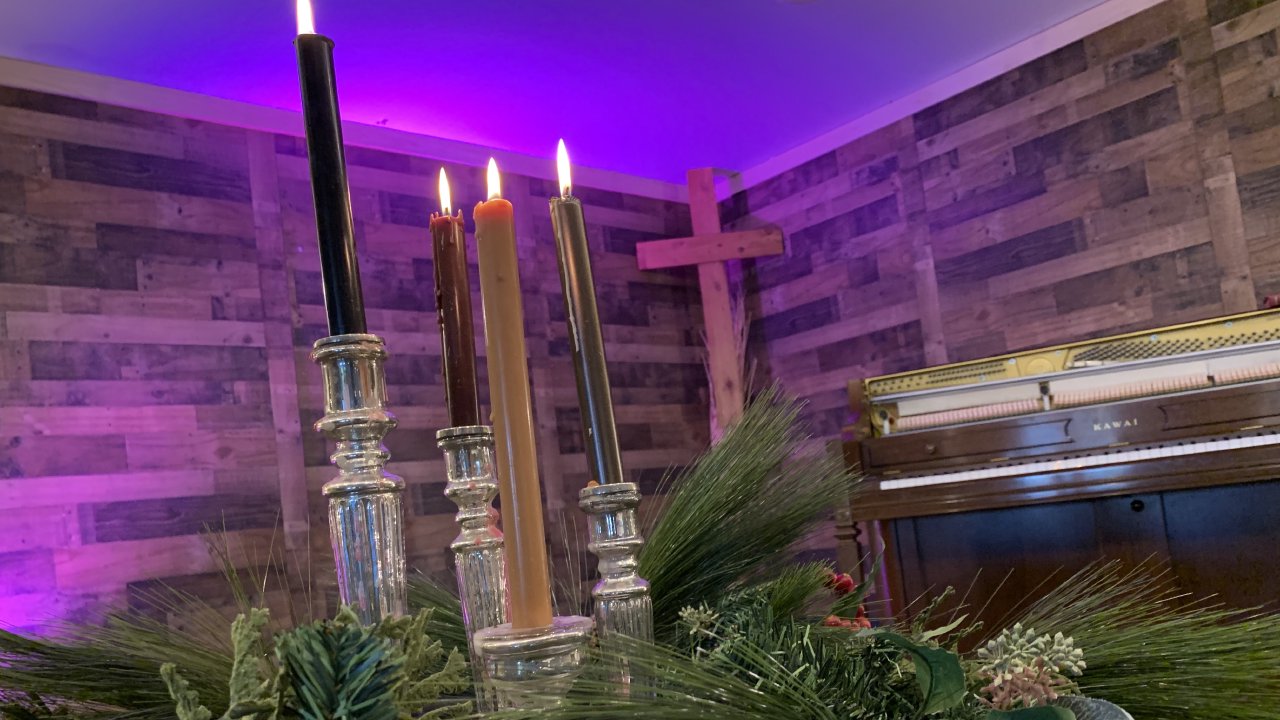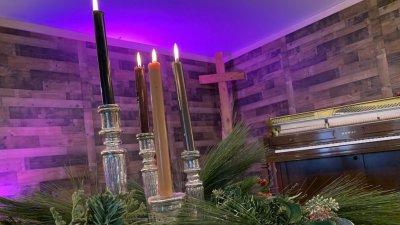DEVOTION: In the ancient Middle East bread was a staple part of people's diet. It was the most reliable source of energy for the body and was readily available with little preparation. For the Israelites in particular, bread was considered a special food because of its religious connotations. In the tabernacle and later the temple, there was a table of showbread in the holy place that symbolize God's desire to fellowship with his people as well as a bit of manna that was hidden in the Ark of the Covenant in the Holy of Holies as a symbol of God's provision
When Jesus used the phrase “bread of life” and “bread from heaven” his listeners would have immediately thought of the story of manna. God gave manna to the traveling Israelites in the wilderness to save them from certain death by starvation. In a similar way God gave Jesus into the world to save us from certain death by separation from him.
But Jesus wasn't simply drawing a parallel to Moses. He taught that THE Bread of Life is greater than the manna of their ancestors received under Moses. In fact, His declaration came shortly after the feeding of the 5000 a miracle that became an object lesson about the greatness of Jesus over Moses. The manna of God provided through Moses satisfied only temporally. The manna Jesus was offering, His very life, satisfies eternally.
Jesus offers himself to all who believe in Him, an invitation to fellowship that isn't restricted to priest as the showbread was but is open to all – just as Jesus himself ate with tax collectors, prostitutes and sinners. And in the beautiful picture of the last supper we’re reminded that Jesus broke broken body secures our place at God's table. As a morsel of bread becomes part of our bodies and gives us energy so Jesus becomes part of us when we believe in him and open access to fellowship with God. He satisfies every longing and desire with Himself “in your presence there is fullness of joy at your right hand there is pleasure for evermore” Psalm 16:11. The bread of life invites us to feast on him

Day 5, Week 3 - Jesus, The Bread of Life
Jesus, The Name Above All Names
December 18, 2020 • Ted & Hannah, Lia Kauffman
Christmas Day - Jesus, Lamb of God
December 25, 2020 • Elizzabeth, Bishop Glenn Kauffman
DEVOTION: For most of Jesus disciples the word lamb would have conjured images of bloody sacrifices brought to the temple. But let's take a step back. Why would God require sacrifices in the first place? Sin requires punishment and atonement. The sacrificial system was instituted by God himself to satisfy His righteous wrath, turning it from those who deserve it to the object be in sacrificed. Think of the first sacrifice recorded in scripture, God slaughtered an animal to clothe Adam-and-Eve, covering them and their sins at the animals’ expense. We find many significant sacrifices in the Old Testament. When God tested Abraham’s love, calling him to sacrifice his own son, Isaac, Abraham assured his son that “God himself will provide the lamb for the burnt offering” Genesis 22:8. And God did provide the ram Abraham found at the top of the mountain was killed instead of Isaac. This episode foreshadowed god's provision thousands of years later through the sacrifice of Jesus. Another significant sacrifice was the Passover Lamb. After nine horrendous plagues sent upon the Egyptians in order to secure Israel's freedom, God-sent a final one, meant to kill each firstborn son. But to protect the Israelites, God instructed them to sacrifice a lamb and brush its blood on the doorposts “the blood will be a sign … when I see the blood I will pass over you” Exodus 12:13. Here, the Passover lamb points toward Jesus whose blood would cause God's wrath to pass over those covered by it. Throughout the Bible, sacrificial lambs were killed in order to bear the burdens of people sins. Sin was transferred from the guilty party to the animal. The person was declared innocent while the animal bore the sin’s just punishment: death This sacrificial system, instituted by God himself, was limited in scope: the sacrifice of atonement was required every year. But it was all meant to foreshadow Jesus. The lamb of God came to fulfill and supersede the sacrificial system. His death on the cross atoned for all of humankind’s sins once and for all, through faith in Him This is not blind forgiveness but violent justice, not cheap grace but costly grace, not temporary oversight but eternal reconciliation. God doesn't ignore our sins - he acknowledges them and makes provision for them through his own Son. The lamb of God makes possible our relationship with God CHALLENGE: Have you lost the wonder and awe of Jesus' sacrifice for your sins? Today worship Jesus for His sacrificial atonement, for taking your sins on Himself. Pick a hymn or a song that speaks of His sacrifice and sing it to Him in thankfulness.
Day 4, Week 4 - Jesus, The Man of Sorrows
December 24, 2020 • Lia, Melissa Richardson
DEVOTION: In a society that avoids pain at all cost, Jesus actions are hard to grasp. We’re surrounded by medications to relieve pain. Many turn to drugs, abortion, euthanasia in an effort to eliminate discomfort and inconveniences from life. But rather than run away from pain Jesus ran headlong into it. In the garden of Gethsemane, we glimpse the mental anguish Jesus experiences before his betrayal. He told his disciples, "my soul is overwhelmed with sorrow to the point of death" Matthew 26:38 and Luke describes Jesus distress as so intense that his sweat was like drops of blood falling to the ground Luke 22:44. Knowing full well the suffering that awaited him, Jesus pleaded with the Father to consider an alternative plan. The physical suffering, He would have to endure alone would be enough to cause any one of us to turn away, and we know enough about the Romans cruelty during crucifixions to be shaken by their brutality. But Jesus also suffered in emotional agony of being forsaken by his Father, and the spiritual anguish of bearing all the ugly inhumane horrific sins of the world on his shoulders. It was enough to make anyone want to flee in the opposite direction But Jesus knew that there was no “plan B” to satisfy God's righteous wrath. Only He could secure salvation for his beloved creatures, so He willingly accepted the hard road before him even though He did not deserve any of it: the betrayal, the mocking trial, the beating, the scorn, the humility and the torturous death through suffocation on a cross. Amazingly, Jesus had the power to stop it all with just one word, but His love for us compelled Him to step forward. He willingly walked into this His suffering, humbly allowing Himself to be ridiculed by the very ones he came to safe. Every agonizing moment he hung on the cross was another whispered “yes” to his painful course. He who commanded the universe and enjoys the worship of angels step down from heaven to despise and reject the rejected by humans. And he did it all for love.
Day 3, Week 4 - Jesus, Son of Man
December 23, 2020 • Paris, Faithful Ladep-Nandang
DEVOTION: A close study of the Gospels reveal that the most common title Jesus used for himself is the “Son of Man”. In fact, he used it 81 times in the Gospels though no one else used it to refer to Him. When the Jews heard Jesus call himself the “Son of Man”, their minds would have immediately leapt to Daniel 7. In this prophecy Daniel writes about the end times when "one like the Son of Man" will come with authority to judge the world. Jesus was claiming that title for himself and communicating to his first hearers that He has the right to judge humanity. But this title also refers to Jesus own humanity. Think of the humility Jesus endured in becoming the “Son of Man”: God eternal and magnificent “made himself nothing by taking the very nature of a servant being made in human likeness. And being found in appearance as a man, he humbled himself and became obedient to death even death on a cross” Philippians 2:7-8. Jesus emptied himself of heavenly glory while still retaining his Deity and submitted to the humiliation of becoming a human. From his position as Lord of the universe, he stooped down to become a servant, washing his disciple’s dusty feet. He set aside all his prerogatives and became like one of us, bound by time and space, trading all the riches of heaven and becoming poor in both the literal and figurative sense. This “Son of Man” was unlike any other son or daughter of man. Fully God and fully man, Jesus entered our physical existence and experience the joys and anguish of being human, yet without sin. What could possibly motivate him to do this? Love. That is the beauty of the doctrine of the incarnation God invisible, glorious and untouchable took on flesh. For us.





